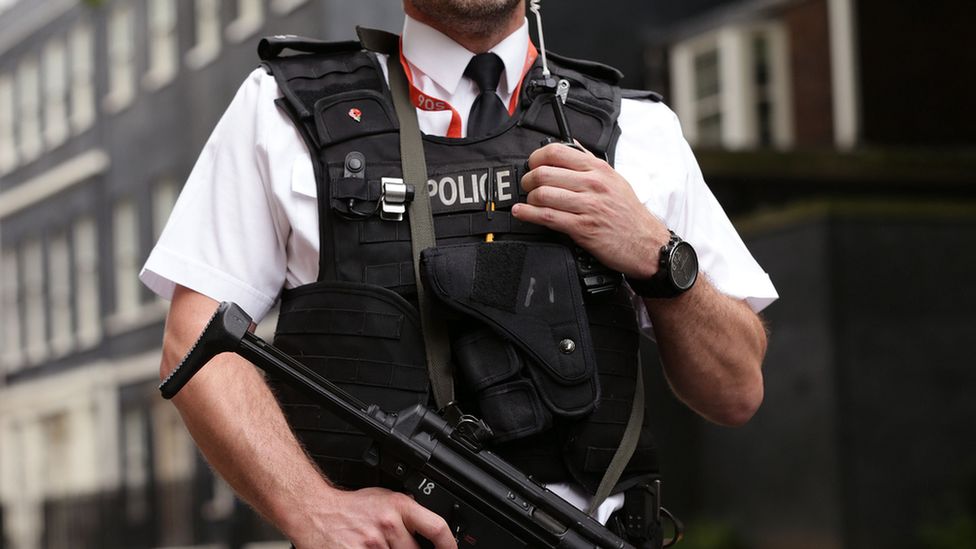
By Thomas Mackintosh & Tom Symonds
BBC News
The Army has been stood down from supporting the Metropolitan Police after hundreds of officers stepped back from firearms duties.
Soldiers were put on standby after some armed officers spent the weekend considering their position.
It follows an officer being charged with murdering Chris Kaba, 24, who was shot last September.
Officers from other forces were drafted in to help, but the Met said on Monday that enough have returned to duty.
Earlier, the BBC was told up to 300 armed officers had turned in permits allowing them to carry weapons over the weekend. There are more than 2,500 armed officers in the force.
But the Met said on social media: “As of lunchtime on Monday, the number of officers who had returned to armed duties was sufficient for us to no longer require external assistance to meet our counterterrorism responsibilities.”
It added that a “limited number” of armed officers from other forces continued to support its non-counterterrorism armed policing.
The Ministry of Defence said it received a request – known as Military Aid to the Civil Authorities – from the Home Office on Sunday to “provide routine counterterrorism contingency support to the Metropolitan Police, should it be needed”.
A number of officers took a step back from their armed duties following their concerns over the Crown Prosecution Service’s decision to charge officer NX121 with Mr Kaba’s murder.
Earlier on Monday, the Met said senior officers were having “ongoing discussions” to support staff to fully understand those concerns.
“Many are worried about how the decision impacts on them, on their colleagues and on their families,” a spokesperson said.
Prime Minister Rishi Sunak has backed a review ordered by the home secretary over the weekend to look into armed policing guidelines, which Downing Street said was expected to conclude by the end of the year.
“Our firearms officers do an incredibly difficult job,” Mr Sunak said.
“They are making life or death decisions in a split-second to keep us safe and they deserve our gratitude for their bravery.
“It is important when they are using these legal powers that they do so with clarity and they have certainty about what they are doing, especially given the lethality they are using.”
Commenting on the review, Met Police commissioner Sir Mark Rowley suggested firearms officers were concerned that they would face years of legal proceedings, “even if they stick to the tactics and training they have been given”.
“Officers need sufficient legal protection to enable them to do their job and keep the public safe, and the confidence that it will be applied consistently and without fear or favour,” Sir Mark wrote in a letter to the home secretary.
But, he argued when officers acted improperly, the system “needs to move swiftly”.
One former officer, who left the Met’s specialist firearms command a few months ago, told BBC Radio 4’s Today Programme that the risk to officers and their families “is just too great”.
Speaking anonymously, he argued that this was not a co-ordinated protest.
“What is obvious to me, they are not acting out of anger or petulance”, the ex officer said.
“These are individuals with partners and families who are incredibly committed to their profession.
“They’re incredibly concerned it’s not worth it anymore.”
Nick Aldworth, a former national counterterrorism co-ordinator, told the PA news agency that by acting en masse, the officers who had stepped back from their duties were in effect staging an industrial protest – despite rules that stop them going on strike.
“What is happening now is not people who are experiencing a sudden questioning of morally whether they want to carry a gun, or do they really feel that the law doesn’t support them, they are engaged in industrial protest,” he argued.
“For good reason, the Police Act does not allow police officers to strike or undertake industrial action. But that is what this is, quasi-industrial action.”
Although the military could have been used in the event of a terror attack, the Met stressed armed forces personnel would not have been used in a “routine policing capacity”.
New Scotland Yard said measures would be kept under review but added that since Saturday evening extra officers have been called in from neighbouring police forces.
The Mayor of London, Sadiq Khan, insisted the city was properly protected and he remained “in daily contact” with the Met commissioner.
The National Police Chiefs’ Council told the BBC mutual aid was “routinely used” across the country to ensure public safety.
A spokeswoman for the Bedfordshire, Cambridgeshire and Hertfordshire armed policing unit confirmed it had sent officers to London to help the Met.
But Leicestershire Police said it had declined to give mutual aid “for the time being”, while several other forces told the BBC they had not received requests for support.
A former Met Police firearms officer says putting troops on the street should be ”a wake-up call”
According to Home Office figures, between March 2022 and March 2023 there were 18,395 firearms operations in England and Wales – the Met Police accounted for 20% of these.
In that time, there were only 10 incidents across England and Wales when an officer opened fire at a person, the figures show.
On 5 September 2022, Mr Kaba was fatally hit by a gunshot fired by a Met Police officer into a vehicle in Streatham, south London.
The construction worker, who was months away from becoming a father when he was shot, died in hospital the following day.
It later emerged that the Audi Mr Kaba was driving, which did not belong to him, had been linked by police to a gun incident the day before.
His death prompted a number of protests.








